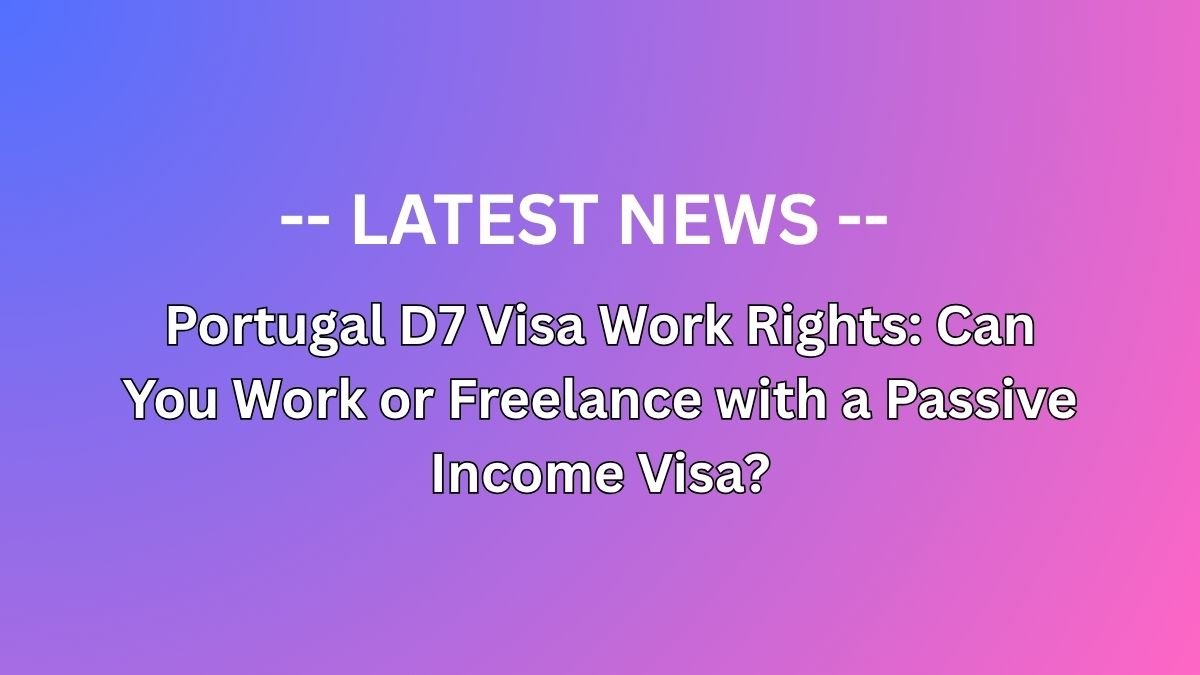LISBON, Portugal—Portugal’s D7 Visa, often hailed as the “Passive Income Visa,” has become one of Europe’s most popular residency pathways for financially independent individuals. But a persistent question hangs in the air for many applicants: can you actually work on a D7 visa?
The short answer is: yes, but it’s complicated, and your work income doesn’t count toward your eligibility.
Here is what you need to know about the D7 visa, its work rights, and the key differences between it and other Portuguese visas.
The Purpose of the D7 Visa
The D7 visa, which has been part of Portuguese law since 2007, is a residency program designed for non-EU citizens who can prove they have a stable, regular, passive income that allows them to support themselves without needing a job in Portugal.
- Primary Applicants: This visa is most popular with retirees living on pensions, individuals with income from rental properties, or investors living off dividends, royalties, and other long-term financial assets.
- Minimum Income: The primary applicant must demonstrate a monthly income of at least €870 (the current Portuguese minimum wage) or €10,440 annually. This amount increases by 50% for a spouse and 30% for each dependent child.
Crucially, the D7 visa is intended for people who can afford to live in Portugal without having to work a local job to meet their basic financial needs.
The Legal ‘Gray Area’ of Working
While the D7 visa is not an employment visa, many immigration lawyers and experts agree that once a D7 holder receives their residency permit, they are legally allowed to work. The initial four-month D7 visa, stamped in your passport, is an entry visa to Portugal, and it’s the residency permit you apply for once you’ve arrived that grants you the right to work.
However, this is not always a guaranteed or clear-cut process:
- You Still Need Passive Income: Any income earned from working in Portugal cannot be used to meet the D7’s minimum passive income requirement. The work income must be entirely separate and secondary to your primary passive income source.
- The Tax Implication: Once you become a tax resident in Portugal, your worldwide income becomes subject to Portuguese tax.
- The Waiting Game: Due to backlogs at the Agency for Integration, Migration, and Asylum (AIMA), the new immigration body, it can take six months or longer after your arrival to receive your residency card, meaning you may have to wait before you can legally begin working.
What About Other Visas?
For those whose primary intention is to work in Portugal, other visas are a better fit.
- The Digital Nomad Visa (D8): This visa is specifically for remote workers who are employed by a foreign company or work as a freelancer for foreign clients. The D8 requires a higher minimum monthly income of approximately €3,480, as it is based on active work income rather than passive income.
- The Job Seeker Visa: This visa allows you to enter Portugal for up to 120 days for the specific purpose of finding a job.
Conclusion
While the D7 visa is designed for a financially independent lifestyle based on passive income, it does not explicitly forbid working once you have obtained a residency permit. Many retirees, remote workers, and freelancers successfully use this visa to live in Portugal while continuing to earn. However, the path is not without its uncertainties. For anyone planning to work in Portugal, it is essential to ensure you first meet the passive income requirements, understand the tax implications, and be prepared for potential delays in receiving your residency permit.
Affiliate Disclosure
This article is a news report and does not contain affiliate links. We do not receive compensation for any links or products mentioned.
Disclaimer
This information is for general guidance and is based on publicly available details about Portugal’s D7 visa regulations as of October 2025. Visa laws are subject to change, and interpretation by immigration officials may vary. This article is not a substitute for legal advice. All applicants are strongly advised to consult with a qualified, licensed immigration attorney or official government sources before beginning the application process.
Official Website Links:
- VFS Global for D7 Visa application: https://www.vfsglobal.com/one-pager/portugal/india/english/pdf/checklist_for_d7_new.pdf
- Official Portal for Portuguese Visas: https://vistos.mne.gov.pt/en/
- Portuguese Tax Authority: https://www.portaldasfinancas.gov.pt/at.eacessoPublico/eacessoPublico.action







